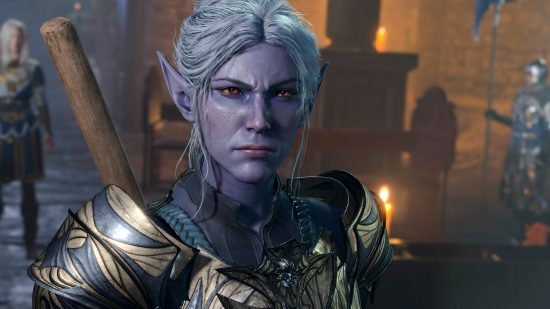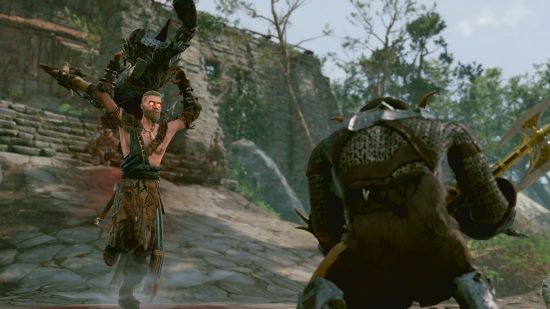What are the best Baldur’s Gate 3 feats? Crafting your own unique brand of adventure is all part of the Baldur’s Gate 3 experience; creating a character that can best their foes and solves problems in a way that sings to you is very satisfying. Baldur’s Gate 3 feats are a way to add some flavor to your build and create power spikes that will help you in your journey.
You’ll naturally grow in power as you explore the world of Baldur’s Gate 3, and gaining levels will reward you with stat increases, occasionally allowing you to choose a feat to add to your character. Feats are special additions that can either give you a big boost to your core Baldur’s Gate 3 abilities, let you learn new spells, or grant you a passive skill. Here is every BG3 feat so you know exactly what to expect as you level up in Baldur’s Gate 3.
The best Baldur’s Gate 3 feat
The best Baldur’s Gate 3 feats are:
- Magic Initiate
- Mobile
- Ritual Caster
- Tough
Magic Initiate
Magic Initiate comes in a few flavors (sorcerer, bard, etc), and allows you to take one cantrip and two spells from that class’s spell list – no matter your class. This allows you to let a little magic into your life even if you didn’t have it before, in the same way, some subclasses allow you to wield spells. We’d recommend checking out out full list of BG3 spells before choosing this though, to make sure you select the best one.
Mobile
Mobile increases your base speed, which is a great buff as it is, potentially putting you out of range of attack when you otherwise wouldn’t be, but the mobile feat also prevents you from being affected by rough terrain.
Ritual Caster
Ritual Caster allows you to pick two ritual spells, regardless of your class, that can be used at any time outside of combat, without using up a spell slot.
Tough
One of the most important things in BG3 is your health, the more hit points you have, the more hits you can take without going down. Therefore, tough is a pretty simple but great feat, as you increase your HP by two for each of your levels.
That said, the best feats really depend on your chosen class and race, and what will benefit your style of gameplay, so make sure you familiarize yourself will all of the BG3 feats below before you choose.
All Baldur’s Gate 3 feats
Here is every feat currently available in Baldur’s Gate 3:
- Ability Improvement: You increase one ability by 2, or two abilities by 1, to a maximum of 20.
- Actor: Your charisma increases by 1, to a maximum of 20. Your proficiency bonus is also doubled for deception and performance checks.
- Alert: You can +5 bonus to initiative and can’t be surprised.
- Athlete: Increase your strength or dexterity by one point to a maximum of 20. Standing up after using prone uses fewer movement points.
- Charger: You gain Charger: Weapon Attack and Charger: Shove.
- Crossbow Expert: When you make crossbow attacks within melee range, the attack rolls do not have disadvantage. Your piercing shot also inflicts gaping wounds for twice as long.
- Defensive Duelist: Use your reaction to add a bonus to your AC (armor class) when receiving a melee attack.
- Dual Wielder: Add bonus AC when holding a melee weapon in each hand. Gain the ability to fight with two weapons, even when those weapons are heavy.
- Dungeon Delver: You gain advantage on perception checks made to detect hidden objects and on saving throws made to avoid or resist traps. You gain resistance to the damage dealt by traps.
- Durable: Your constitution increases by 1, to a maximum of 20. You regain full hit points each time you take a short rest.
- Elemental Adapt: Your spells ignore resistance to a damage type of your choice. When you cast spells of that type, you cannot roll a 1.
- Great Weapon Master: Scoring a critical hit, or killing a creature with a melee attack grants you another bonus melee attack.
- Heavy Armour Master: Your strength increases by 1, to a maximum of 20. Incoming damage from non-magical attacks also decreases by 3 while you’re wearing heavy armor.
- Lightly Armoured: Gain proficiency in light armor, and increase your dexterity or strength by one point.
- Moderately Armoured: Gain proficiency in medium armor, and increase your strength by one point.
- Heavy Armoured: Gain proficiency in heavy armor, and increase your strength by one point.
- Lucky: You gain 3 luck points, which you can use to gain advantage on attack rolls, ability checks, or saving throws, or to make an enemy reroll their attack rolls.
- Mage Slayer: When a creature casts a spell within melee range of you, you have advantage on any saving throw against it, and you can use a reaction to immediately make an attack against the caster. Enemies you hi have disadvantage on concentration saving throws.
- Magic Initiate Bard: You learn two cantrips and a level 1 spell from the bard spell list. You can cast the level 1 spell once per long rest. Your spellcasting ability for all three spells is charisma.
- Magic Initiate Cleric: Receive one spell slot, learn two cantrips and one level 1 spell from the Cleric spell pool. You can cast the level 1 spell once per long rest. Your spellcasting ability for all three spells is wisdom.
- Magic Initiate Druid: You learn two cantrips and a level 1 spell from the wisdom spell list. You can cast the level 1 spell once per long rest. Your spellcasting ability for all three spells is wisdom
- Magic Initiate Sorcerer: You learn two cantrips and a level 1 spell from the sorcerer spell list. You can cast the level 1 spell once per long rest. Your spellcasting ability for all three spells is charisma.
- Magic Initiate Warlock: Receive one spell slot, learn two cantrips and one level 1 spell from the Warlock spell pool. You can cast the level 1 spell once per long rest. Your spellcasting ability for all three spells is charisma.
- Magic Initiate Wizard: Receive one spell slot, learn two cantrips and one level 1 spell from the Wizard spell pool. You can cast the level 1 spell once per long rest. Your spellcasting ability for all three spells is intelligence.
- Martial Adept: Learn two moves from the Battle Master archetype and receive one superiority dice to fuel it. Retrieve a warn superiority dive after a short or long rest.
- Medium Armour Master: When you wear medium armour, it doesn’t impose disadvantage on stealth checks. The bonus to armor class you can gain from the dexterity modifier also becomes +3 instead of +2.
- Mobile: Increase the speed of your character, you are no longer slowed by difficult terrain. You no longer trigger opportunity attacks from enemies after attacking.
- Moderately Armoured: You gain armor proficiency with medium armor and shields, and your strength or dexterity increases by 1, to a maximum of 20.
- Performer: You gain musical instrument proficiency, and your charisma increases by 1, to a maximum of 20.
- Polearm Master: When attacking with a glaive, halberd, quarterstaff, or spear, you can use a bonus action to attack with the butt of your weapon. You can also make an opportunity attack when a target comes into range.
- Resilient: You increase an ability by 1, to a maximum of 20, and gain proficiency in that ability’s saving throws.
- Ritual Caster: Learn two ritual spells of your choice.
- Savage Attacker: When making weapon attacks, you roll your damage dice twice and use the highest result.
- Sentinel: When an enemy within melee range attacks an ally, you can use a reaction to make a weapon attack against that enemy. Target ally must not have the Sentinel feat. You gain advantage on opportunity attacks, and when you hit a creature with an opportunity attack, it can no longer move for the rest of its turn.
- Sharpshooter: Your ranged weapon attacks do not receive penalties from high-ground rules. Ranger weapon attacks with weapons you are proficient with have a -5 penalty to their attack roll but deal an extra 10 damage.
- Shield Master: You gain a +2 bonus to your dexterity saving throws while wielding a shield. If a spell forces you to make a dexterity saving throw, you can use a reaction to shield yourself and diminish the effect’s damage. On a failed saving throw, you only take half damage. On a successful saving throw, you don’t take any damage.
- Skilled: Gain proficiency in any three skills.
- Spell Sniper: You learn a cantrip, and the number you need to roll a critical hit while attacking is reduced by 1. This effect can stack.
- Tavern Brawler: When you make an unarmed attack, use an improvised weapon, or throw something, your strength modifier is added twice to the damage and attack rolls.
- Tough: Increase your maximum health points by two per level.
- War Caster: You gain advantage on saving throws to maintain concentration on a spell. You can also use a reaction to cast shocking grasp at a target moving out of melee range.
- Weapon Master: Increase strength or dexterity by one and become proficient in four weapons of your choosing.
Now you know every Baldur’s Gate 3 feat, you’ll have an idea of what to aim for when leveling your character. Bear those BG3 proficiencies in mind, and try to choose feats that will compliment your abilities and skills, and note that sometimes opting for a raw stat increase over a feat is the right choice if you want to deal maximum damage. If you’d rather create beautiful music than bring down destruction, we have all the Baldur’s Gate 3 instruments here, so you can your party can carry joy everywhere they go – and, who knows, that stunning strumming might even earn you a BG3 romance. We’re referring to playing the lute, obviously.

